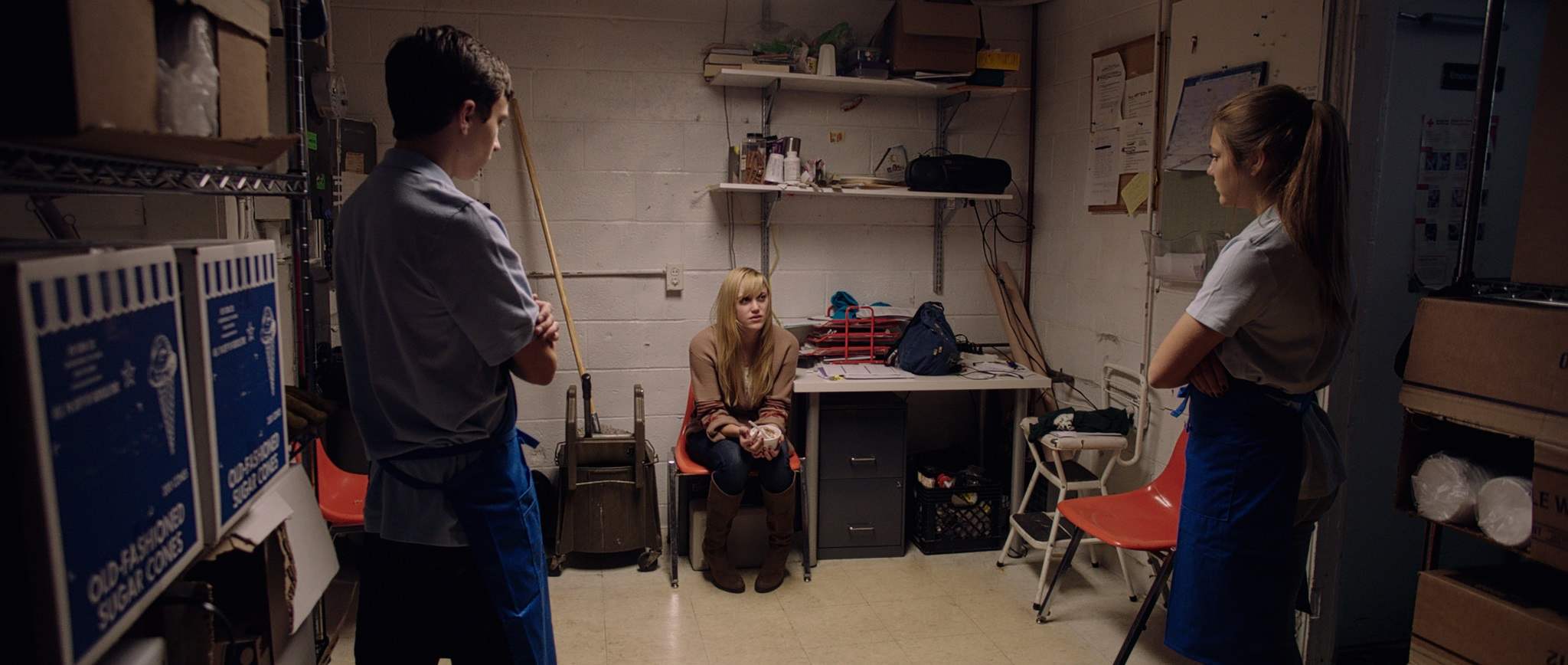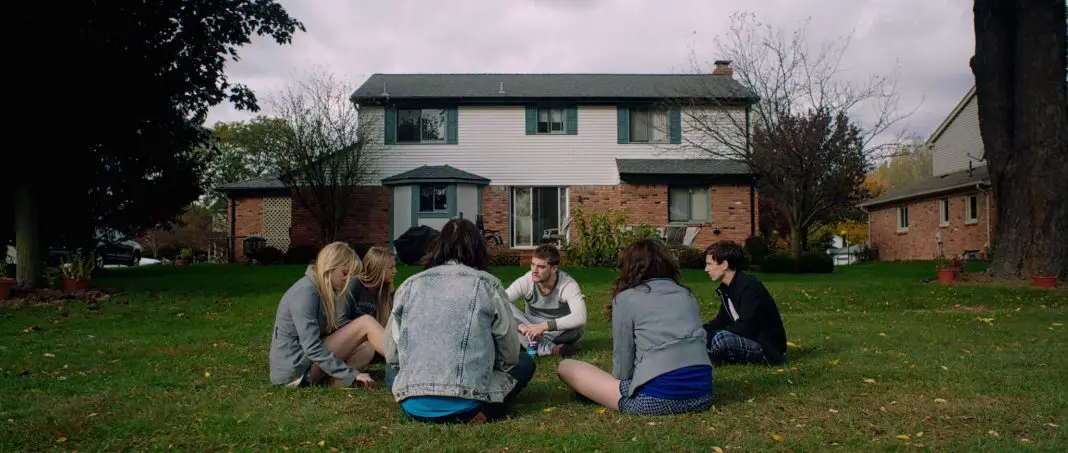Wicked Horror managing editor Tyler Doupe´spoke with Keir Gilchrist about playing Paul in the indie breakout hit It Follows. The actor filled us in on the unprecedented success of It Follows, offered his take on the film’s subtext, explained why he loves making horror movies, and also touched on his involvement with Tales of Halloween!
It Follows has proved to be an indie film success story, opening at just four locations and ultimately expanding to 1,655 screens based on initial box office returns. The picture is headed for DVD, Blu-Ray, and Digital HD July 14th from Anchor Bay Home Entertainment.
It Follows finds Jay (Maika Monroe) engaging in sexual congress with her new boyfriend and then being plagued by disturbing visions and the unshakable notion that she is being followed. She then finds herself in a race against time to pass the plague along or find a cure before it’s too late.
Related: It Follows is a Frightening, Original and Involving Horror Movie
Wicked Horror: I think of It Follows like the little indie film that could. It started in less than five theatres and based on that initial success expanded to a roughly 1,600 screen release. Did you have any indication when you were making the film how deeply it would resonate with audiences?
Keir Gilchrist: I really had no idea when making the film. I’m not gonna say no one did but I really don’t think anyone did. Obviously, I think with the initial festival success–you know going to Cannes and Toronto and then also Sundance–we had some indication that at least it was going to get some critical acclaim but I definitely did not expect it to be as well received by the general populous, I guess, because it is a very strange concept for a film. I feel like they just did a great job on marketing as well. On set, though, no idea at all. I didn’t even know if it was going to turn out. I remember there were a couple times where I turned to David [Robert Mitchell] and was like, ‘Hey, are the ‘its’ gonna look any different than this? Are they just gonna be people or are you gonna go in and layer CGI? What are you gonna do?’ And he was just like, ‘No, they’re just gonna be people.’ And I think we were all just like, ‘OK, we’ll see if that scares people.’ And it was amazing how much it did and it does. So, I’m stoked about it.
WH: It’s definitely a strange concept but at the same time, I think that’s partially to be attributed to the success of the film. It works because it is so different. I think that people, horror fans in particular, maybe appreciated that after seeing a lot of the same stuff regurgitated over and over again. It’s kind of refreshing to see something that’s vaguely reminiscent of early John Carpenter but at the same time totally unlike anything we’ve seen before.Keir Gilchrist: Yeah, when John Carpenter was saying that he loved the film and I think said something like, ‘Finally a film that understands suspense’. All of our hearts skipped a beat. I think that was the goal and that was the dude to impress. Yeah. I think you’re right. I think people were just ready for this kind of film. I’m a horror fan but I’ve been really bored with the genre for a while now, to be honest. And I think this film, people were sort of ready for something like this that changes it up.
WH: I’ve read a lot of different theories and have some of my own about the subtext of the film. But I am curious to hear your thoughts on what you think some of the film’s social commentary may be driving at.
Keir Gilchrist: I think, one thing to know is that David never told us. He’s the kind of director who will ask, ‘What do you think about this? Why do you think Paul did this?’ And you’ll say, ‘Maybe, is it this?’ And he’ll say, ‘Interesting.’ and just walk off. And he would even say, ‘You make up your mind but don’t tell me.’ I think, in general, the film has this weird, ambiguous quality where no one can quite put their finger on what it’s about. There’s definitely multiple messages that I can see. I think it has less to do with trying to scare teens away from having sex or being an anti-sex movie. I think that’s a very basic way to look at it–it’s a bit simple. I don’t think it’s just about the dangers of sex or anything like that. I think it has a lot more to do with the concept of mortality and knowing that you’re going to die–it’s this unavoidable thing and no matter where you go, it’s coming. I don’t know. The more I talk to people about it, the more I’m like, ‘I’m not sure what it’s actually about, really, because that was a pretty good idea.’ To me, it’s more in the realm of something like that than it is about sex or anything like that. There’s obviously a lot to do with sex but I think that’s a more simple way to look at it.
 WH: I agree. I definitely think there’s much more to it than what is presented on the surface. Speaking of your interpretation of your character’s motivation: I’m curious to hear your thoughts on the sequence where you offer to help Jay with her situation. I’m being deliberately cryptic to try not to spoil anything for people that have not seen the film. But did you think Paul was being altruistic or that he was doing it for more self serving motives?
WH: I agree. I definitely think there’s much more to it than what is presented on the surface. Speaking of your interpretation of your character’s motivation: I’m curious to hear your thoughts on the sequence where you offer to help Jay with her situation. I’m being deliberately cryptic to try not to spoil anything for people that have not seen the film. But did you think Paul was being altruistic or that he was doing it for more self serving motives?
Keir Gilchrist: Well, that’s the interesting thing with Paul, I think, in general, throughout the film. After I’d seen it for the first time, I was talking to David and I was kind of like, ‘Wow, people found Paul a lot funnier than I think we intended.’ And I think people interpret it in their own way. But to me, I think Paul really does care a lot about Jay and I think he believes he can solve the problems that she has. But it’s also funny and I love it that people find it so funny that he’s constantly trying to ask if he can take it and thinks he can handle it. It’s funny that people find that funny and think that he’s just trying to get laid. But in actuality, I don’t think that was our intention and I think it was just one of those really nice surprises. And we just were really stoked that people saw different things in the film than we saw making it.
WH: You mentioned earlier that you are a horror fan. That makes me curious if that has been a factor in your involvement with films like this, Dark Summer, and Dead Silence?
Keir Gilchrist: I think my interest in genre films has always attracted me to genre films. I can honestly get through a horror or sci-fi script faster than a mumblecore script or [a script] with a lot of sitting and talking or a lot of crying. I feel like it just sort of catches my interest. Those are the films I like to watch on my own time. I like the escapism. It’s definitely like, I’ll get five scripts and I end up reading the horror or sci-fi script first. That’s definitely informed that. But I like all types of film and I hope that I can continue to do as many as I can and not get pigeonholed or whatever. So, I just try and change it up a lot, even if that means, in some ways, being more choosey about doing horror films and not just becoming a horror guy, even though that is what I love, as an actor, I want to be flexible.
 WH: I think that’s really smart of you and I think it shows in the choices you’ve made. You haven’t made an endless stream of horror films, even though that may be tempting. I think you show a lot of foresight in the roles you chose and I think that’s really smart. And I think that will speak to your longevity in the future. On another note, I’m a big fan of Paul Solet, who directed you in Dark Summer, which makes me curious if it was your experience working with him that led to your involvement with Tales of Halloween?
WH: I think that’s really smart of you and I think it shows in the choices you’ve made. You haven’t made an endless stream of horror films, even though that may be tempting. I think you show a lot of foresight in the roles you chose and I think that’s really smart. And I think that will speak to your longevity in the future. On another note, I’m a big fan of Paul Solet, who directed you in Dark Summer, which makes me curious if it was your experience working with him that led to your involvement with Tales of Halloween?
Keir Gilchrist: Yeah, Paul and I are, I would say, very good friends. We got along very well shooting Dark Summer. Honestly, he’s one of those people you meet and I feel like we’re somehow related or something. He and I are very similar people. When I did Dark Summer, I sat down with him and we found out that we have a lot of similar interests. He comes from a hardcore punk background and same with me. And, you know, we both love horror and genre films in general so much. We talk a lot about westerns and thrillers and stuff, too. I would love to work with him again and that is totally why I did that movie. I’m stoked to see the finished product I think it’s time for a solid horror anthology again.
WH: Can you tell us a little bit about the segment in which you appear?
Keir Gilchrist: Yeah, the segment I did, I did with Paul and he wrote it. Really the only thing that everyone had to keep with when writing their shorts was that it had to center around Halloween. Some of them are a bit silly and some of them are a bit more serious. Ours is this sort of Sergio Leone western meets The Warriors with a horror twist. So, that’s what we went for! They just let us really have a lot of freedom to play around and try whatever we wanted. I’m really stoked with what we pulled off. It was a really great crew of people that worked on all the shorts. Everybody really pulled together to make that happen.
WH: That sounds awesome. There’s such amazing talent involved with that film. I love just about every single person contributing to it. That must have been a fun project to work on.
Keir Gilchrist: It was. We had a great time with it. We just sort of played around for two nights and it was really good!
WH: Well, that’s all I’ve got for you. It’s been great chatting with you. Thanks so much for talking with us!
Keir Gilchrist: Thank you.





